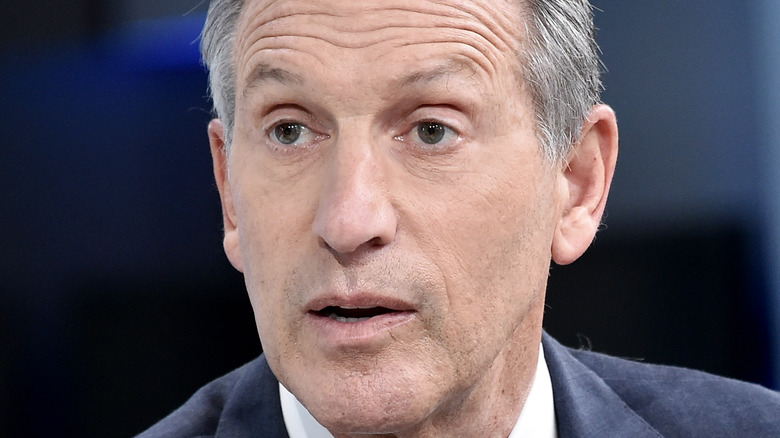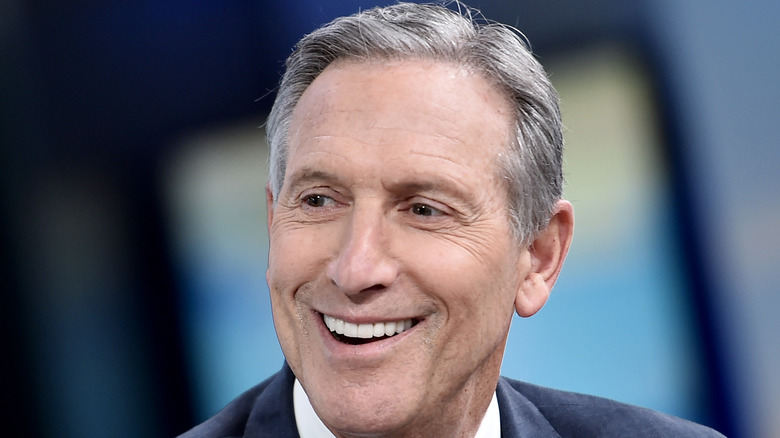Starbucks CEO Howard Schultz Just Accused Unions Of 'Assaulting' Companies
We may receive a commission on purchases made from links.
If you drink coffee — or are, you know, a person living in the world — then you've likely noticed the rise of the apparently unstoppable chain known as Starbucks. After getting its start in 1971 in Seattle, Washington, the chain went public in 1992, according to Brittanica, and began a rapid ascent to the market dominance that, today, is represented by Starbucks' 32,600 global locations.
Over the years, this remarkably successful coffee behemoth has gone through a number of changes, including shifts in the company roster. But one company figure who has been present from the beginning is current interim CEO Howard Schultz, who first joined Starbucks in 1982, according to its official website, coming on as director of retail operations and marketing. Through his study of Italian coffeehouses, Schultz was a key figure in establishing the Starbucks concept on American shores and in steering the company towards its success.
According to Yahoo Finance, Schultz first became Starbucks CEO in 1986, leaving the company in 2000 only to return as CEO from 2008 to 2017. As of April 2022, Schultz returned to Starbucks yet again, to act as interim CEO while the company's board looks for a permanent replacement for newly retired CEO Kevin Johnson (via Forbes). And Schultz — a notoriously anti-union leader — is already shaking things up with some controversial comments made in a town hall-style meeting with company employees.
Starbucks workers are unionizing after a grueling response to the pandemic
On his first day (back) on the job earlier this month, Starbucks' Howard Schultz met with employees to address what he called "the threat of unionization." Schultz returns to Starbucks at a time in which there is a small but accelerating movement towards unionization in the United States. According to Reuters, early company response to the COVID-19 pandemic included heavily shifting operations to Starbucks' mobile app, where customers could place to-go and drive-through orders while maintaining social distancing. While this protected the company's bottom line as sales shot up again after a temporary fall in revenue due to shuttered locations, Starbucks employees reacted with complaints of long lines and being overworked.
In response, more than 100 U.S. locations have moved to unionize their stores to obtain fairer working conditions, including those in New York, Massachusetts, Washington, and Arizona (via Eater). In the latter state, employees of a Phoenix store accused the company of union-busting tactics (via Phoenix New Times), a claim that was upheld today by a federal labor board (via Reuters).
Howard Schultz has historically been anti-union
In his meeting with Starbucks employees, interim CEO Howard Schultz addressed stores' unionization drives. In a video clip, he noted, "Here's where it gets a little sensitive," before stating that companies in the United States are "being assaulted in many ways by the threat of unionization."
In an article published by Yahoo Finance, Starbucks baristas reacted to the CEO's comments. "I think that the comments and actions Howard made today are excuses and not enough to combat the rising issues that we face," a worker from Boston said. "Instead of talking about the union and the issues that baristas face, Howard made constant attacks." Another Boston barista echoed the sentiment, saying, "It just felt like he still doesn't understand what this is all about ... I felt like he was just trying to frame it as the union is the problem as opposed to our management is the problem."
Given Schultz's long history of anti-union feeling, the comments do not, perhaps, come as a surprise. According to Reuters, Schultz has long expressed that Starbucks does not need unions because it relates so closely with its employees. "I was convinced that under my leadership, employees would come to realize that I would listen to their concerns," he wrote in his 2012 memoir "Pour Your Heart Into It: How Starbucks Built a Company One Cup at a Time" (via Reuters). "If they had faith in me and my motives, they wouldn't need a union."


